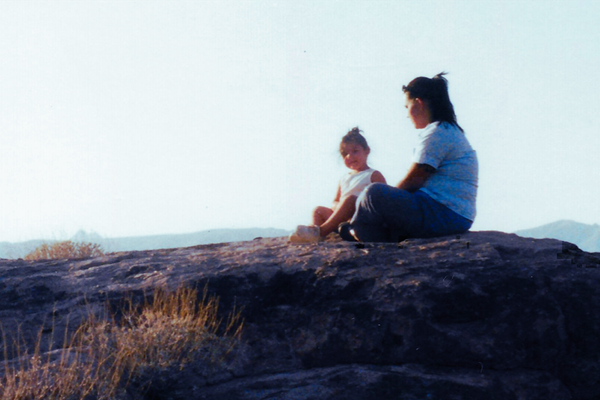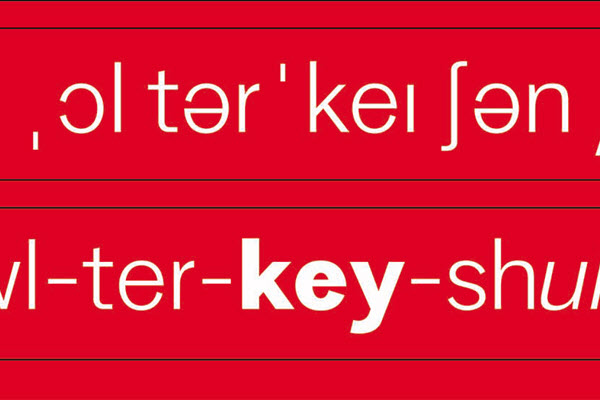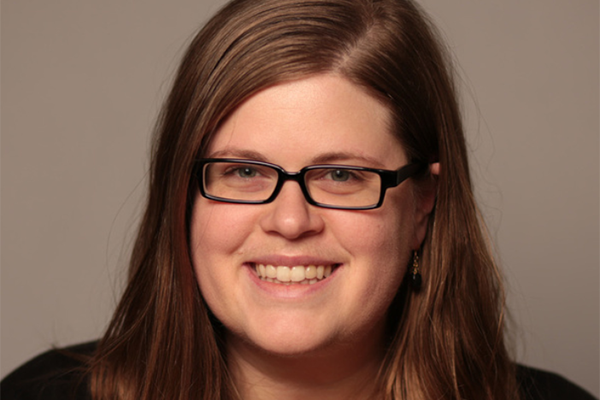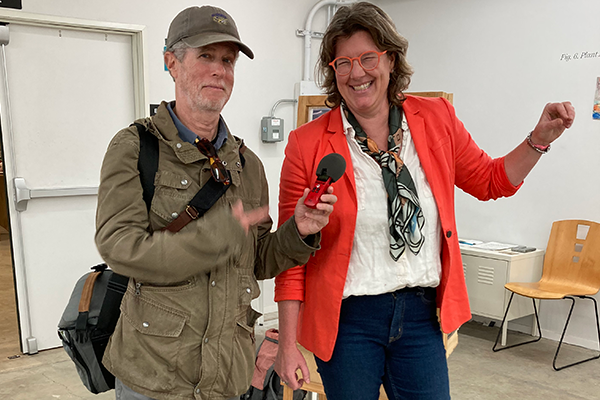News and Announcements

With a video camera in her hands and empathy in her heart, one SF State student is focusing her capstone project on a subject many families prefer to avoid: their intergenerational trauma.
Cecilia Mellieon, a graduate student in Anthropology, is the director of a documentary titled “He told us the sky is blue.” It traces her family’s trauma to Native American oppression, focusing on the Indian boarding school her father attended in Fort Apache, Arizona.
“If it hadn’t been for his experience there, he would have never left his family or his village,” said Mellieon, a member of the Tohono O’odham Nation. “He would have never moved to the Bay Area, and so I would not even be here if it wasn’t for him making those decisions to get away from them.”
The U.S. government established the boarding schools to teach English and trade skills to Native American children. Violent corporal punishment occurred often.
“The ultimate goal was to have fully assimilated second-generation children — children who were removed from their lands, children who didn’t grow up with their culture or their language or their family members,” Mellieon said.
In her 55-minute film, Mellieon’s family recalls surviving an abusive household. They share feelings of sadness and regret as they also work to resolve their anger.
“These are stories that I know too well, because I was there,” Mellieon said. “There are scenes where my brother and my mom are breaking down crying. I was crying with them.”
Born and raised in San Francisco, Mellieon is passionate about telling stories of urban Native American life with nuance and sensitivity. She uses a supportive, collaborative approach that aims to not only create an ethnography, but also a work that will benefit the subjects.
Her approach is an application of visual anthropology, a field of study that was founded by late SF State faculty members John Adair and John Collier. SF State Anthropology Professor Peter Biella (B.A., ’72; M.A., ’75) was one of Collier’s students, and today he is Mellieon’s adviser.
Mellieon entered SF State as an undergraduate in 2018 at age 42. She had just completed her associate’s degree from Los Medanos College while her third child had yet to start kindergarten.
A new Bay Area Rapid Transit (BART) extension to near her home in Antioch made the 50-mile commute to SF State feasible, with family help on child care. Now, one of her children, Tatihn Mellieon, also attends SF State, as a Creative Writing major and a student assistant in The Poetry Center.
“It was the perfect grouping of coincidences that led to me to be able to go to State,” Cecilia Mellieon said. “If I had tried this at any other point in my life, I don’t think I would have had the life experiences. I don’t think I would have had the growth that I needed to be a confident student and be able to feel like I could tackle this.”
Mellieon premiered “He told us the sky is blue” in November at Los Medanos College. She plans to take it to film festivals and make more anthropological films about big-city Indigenous life.

Chalermpol “Pol” Jittagasem (M.A., ’21) created a typeface that tells a story about the immigrant experience, a story he knows well. An immigrant from Thailand, Jittagasem came to the United States 10 years ago on a student visa and struggled to learn English. Words like “subtle,” “basically” and “half” were confusing.
“I had no idea how many syllables there were and where to put the stress,” he said.
As a graduate student in Design at SF State and later as a student in a typography certificate program, he developed a typeface to help English learners with English pronunciation. His project recently caught the attention of the oldest professional design association in the nation: Vaja was included in the STA 100, the Society of Typographic Arts’ (STA) annual competition recognizing the 100 most innovative communication designs from around the world.
Jittagasem’s typeface, which he named Vaja (meaning “speech” in Thai), was designed to help people learning English phonetically pronounce English words. As part of the STA honor, it is featured on the organization’s website along with the other winners.
He created Vaja in Letterform Archive’s Type West certificate program, but he has been playing around with the concept since graduate school. His thesis project was a typographic design that could help Thai speakers pronounce English words.
“A lot of Thai people have difficulty with [English] pronunciation because it’s a different language, and we have to memorize how we stress here and there. Like the word ‘colonel’ — I don’t know why the ‘l’ is in the middle like that, that’s something you must memorize.” To help, he created small details, or cues, on the letterforms that would tell a Thai person how to pronounce English words.
Language and culture have been through lines in Jittagasem’s work, says SF State Design Professor Hsiao-Yun Chu, who worked closely with him in graduate school. “We take the Roman alphabet somewhat for granted; and yet, for people trying to assimilate and learn a language, it can be very daunting,” she said. “His graduate project created new Thai characters that would help English language learners from Thailand to improve their pronunciation, making the process more inclusive. This is a highly creative and humanistic way to look at the power of typography.”
Vaja expanded his thesis to include all English learners, not just Thai people. The typeface comes in bold, italic and thin, and each style represents different sounds and where to put the stress. For example, the bold style indicates where to put the stress on a word and the italics are soft sounds.
The typeface isn’t ready to be downloaded just yet, but when it is Jittagasem hopes it will be used in dictionaries, English pronunciation flashcards, academic writing and even newspapers. In the meantime, he plans to apply to Ph.D. programs in design and visual communications to take his vision even further.

A paper published in the journal Science provides new insight into the rich diversity of the elements of the periodic table. Specifically, scientists found that ancient stars can produce elements with atomic masses greater than any periodic table element found naturally on Earth. The study was conducted by an international collaboration called the R-Process Alliance (RPA), which includes Assistant Professor Charli Sakari.
Stars create elements when they fuse or break apart to produce lighter or heavier elements. The r-process (rapid neutron capture) is the primary way to create some of the heaviest elements. Heavy elements are often unstable or radioactive, and often decay by a process called fission in which elements split. Though researchers have an idea of how the r-process works, the conditions necessary are extreme — collision or explosion of certain stars — and difficult to study closely.
In this paper, the scientists looked at 42 well-studied ancient stars in the Milky Way that were known to have heavy elements created by the r-process. Instead of the usual process of looking at elements of individual stars, they looked for patterns among the heavy elements of the stars collectively. They detected unrecognized patterns that suggest that some of the elements near the middle of the periodic table are the remnants of heavy element fission. The new data suggest that the r-process can produce atoms with an atomic mass of at least 260 before fission. Since scientists have never detected anything that heavy in space or naturally on Earth, it opens new ways to think about models and fission.
“The RPA has observed thousands of Milky Way stars with the aim of finding these chemically interesting stars,” Sakari explained. “With such large numbers, we can really start to compare the chemical abundances of these stars and answer important questions about the processes that created these elements.”
Teddy Albiniak was recently appointed interim ombuds for SF State, President Lynn Mahoney announced Jan. 8. The ombudsperson provides employees with an informal and neutral resource to assist in addressing concerns and resolving issues.
Albiniak has served as the director of Forensics, a lecturer-faculty member in the Department of Communication Studies and special assistant to the president and provost. Other roles include chair and vice chair of the Academic Senate and his contributing to the Staff Council’s constitution writing committee.
“Albiniak’s multifaceted background and accomplishments make him an ideal candidate to serve as interim ombuds, and I have full confidence in his ability to continue build positive relationships within our institution,” Mahoney wrote in her announcement emailed to the campus community.
A search for the position will likely take place in spring 2025.
The College of Professional & Global Engagement (CPaGE) has won an International Award in lifelong learning for Best Programming by the Learning Resources Network (LERN), the largest association in lifelong learning in the world.
CPaGE Associate Dean Angie Lipschuetz accepted the award. The award was one of 20 given at LERN’s annual conference in San Diego attended by 800 professionals in lifelong learning from five countries.
“The award is for innovation in the field of lifelong learning and serving communities,” LERN President William A. Draves said. “These awards enhance the quality and involvement in lifelong learning, an absolutely critical component to individual and community quality of life and prosperity in this century.”
“With more than 100 award nominations every year, gaining an International Award is an outstanding achievement,” Draves added.
Draves also complements CPaGE’s Courses for Causes, which enrolled 250 students during the pandemic.
“Building on that success, they then designed Courses for Careers, an initiative in response to the mass layoffs occurring in the Bay Area in 2023, mainly impacting tech workers,” he said. “These free and discounted courses provided immediate upskilling and reskilling to help dislocated workers find gainful employment as well as potentially launch them into a certificate or degree program. Don’t mistake ‘free’ for non-income producing. Today, they are leads and conversions into certificates and degree programs.
The University Retreat scheduled for Wednesday, Jan. 24, at the J. Paul Leonard Library has been canceled. Watch CampusMemo and Senate Report for updates.
The Office of Human Resources invites all University employees to attend the CSU’s Got Talent webcast on Tuesday, Jan. 16, 10 – 11 a.m. via Zoom. Jonah Berger, best-selling author and professor of Marketing at the Wharton School of Business, will present “Magic Words: What to Say to Get Your Way.”
Join fellow faculty in structured, dedicated and quiet writing time. SF State Transforms and the Center for Equity and Excellence in Teaching and Learning (CEETL) will host weekly faculty writing meetups during the spring semester. Sessions will provide opportunities for faculty to check in about their writing and ample time to work quietly on individual writing projects.
This writing meet-up is part of Transforms and CEETL’s continued efforts to create greater faculty scholarship on campus.
The Transforms-CEETL writing meet-ups are scheduled for every first and third Tuesday, 1 – 3 p.m., and every second and fourth Friday, 1 – 3 p.m.
Event dates:
- First Tuesdays: Feb. 6, March 5, April 2, May 7
- Second Fridays: Feb. 9, March 8, April 12, May 10
- Third Tuesdays: Feb. 20, March 19, April 16
- Fourth Fridays: Jan. 26, Feb. 23, March 22, April 26
Tuesday sessions will be hybrid; join virtually or come in person to the J. Paul Leonard Library. Friday sessions are virtual.
RSVP via Qualtrics. For the Zoom link or any inquiries, please email Ilse Gonzalez.
All members of the campus community are invited to join Human Resources for virtual presentations on many topics that may benefit employees and their families.
Topics include:
- Dealing with Triggers
- Expanding Your Sphere of Influence
- Understanding Mental Health in the LGBTQ+ Community
- Managing Multiple Priorities
- Personal Resilience
- Elder Care Tips/Resources for Caregivers
- Generational Diversity
All presentations are one hour, hosted via Zoom by SF State’s partners at LifeMatters. These will not be recorded due to personal information that may be shared.
Welcome to 2024! CampusMemo has resumed weekly publication. It will publish weekly until Tuesday, May 28. After which, it will publish once a month in June and July. Dates will be determined and shared in a future publication.
The weekly deadline is 5 p.m. on the Tuesday prior to publication. Items can be submitted via Qualtrics. For questions, please email the Office of Strategic Marketing and Communications.

SF State faculty and staff can receive up to 20% off tickets to Cirque du Soleil’s “KOOZA” at Oracle Park in San Francisco on select dates from Jan. 17 to March 24.
“KOOZA” is a return to the origins of Cirque du Soleil: It combines two circus traditions: acrobatic performance and the art of clowning. The show highlights the physical demands of human performance in all its splendor and fragility, presented in a colorful mélange that emphasizes bold slapstick humor.
To redeem this offer, use this special link to the Cirque du Soleil box office. For groups of 10 or more, email Michael Ciaccia and receive 25% off tickets and reduced handling fees.
Professor Emerita of Mathematics Diane Resek passed away peacefully on March 19, 2023, at her home in Berkeley, where she had lived for many years. She served on the faculty at SF State from 1975 to 2005. Her work at SF State in teacher preparation, professional development and curriculum development at the elementary, middle school, high school, undergraduate and graduate levels of mathematics education spans more than three decades. Teachers who have participated in one or more of the programs she has created or supported continue to provide leadership for improving the teaching and learning of mathematics throughout the state of California and beyond.
Read a tribute to Professor Resek on the Berkeleyside website.
SF State Spotlight
A San Francisco Chronicle feature story on Dec. 28 highlights SF State students working in the California College Corps. The state-funded program provides college students with paid opportunities to serve their communities while gaining valuable experience.
Biology major Ailin Torres is a California College Corps participant working for Reading Partners. A native of El Salvador, Torres says she can relate to the elementary school students she tutors.
“I was in their shoes,” she said, so teaching them “is very healing to my soul. It’s not like a job to me.”
Anthropology Professor Dawn-Elissa Fischer participated in a panel discussion at Harvard University on Dec. 16 as part of the “A Celebration in Honor of Marcyliena H. Morgan” event. Fischer’s panel is titled “Marcyliena Morgan as Mentor, Builder, Inspiration.”
Morgan is the Ernest E. Monrad Professor of the Social Sciences and professor in the Department of African and African American Studies at Harvard. Morgan is founding director of the Hiphop Archive & Research Institute, based in Harvard’s Hutchins Center for African & African American Research.
Robert Keith Collins gave an invited lecture at the Menlo Park Library on “Native American Cultural Impact on the U.S.” on Nov. 29. Central in this presentation is the assertion that excessive attention by both American and European scholars on European colonization, exploitation of Indigenous cultures, and exploration of the Western Hemisphere have left changes in U.S. cultures, social interactions in the newly formed nation state, and transformations in lifestyles illusive.
The central question: To what extent did Native Americans have a cultural impact on the United States? To revisit this question, originally engaged by A.F. Chamberlain in the 1890s, this presentation ethnographically explores the dynamic impacts of Native American economies and lifeways on African and European cultures, as discernible from the anthropological and historical records. The information and lives that inform the presentation illustrate how and why Native American cultural impacts on the U.S. must be understood as catalysts for the new crops, drugs and raw materials that facilitated changes in African and European languages and lifeways, if a holistic understanding of the resulting cultural practices, lifestyles and living environments found throughout the U.S. is to be achieved.
A Dec. 16 article in the San Francisco Chronicle highlights how colleges and universities have added more coursework in artificial intelligence (AI) as the technology expands. SF State has offered a certificate in ethical and explainable AI since 2019, taught with courses in Computer Science, Philosophy and Business.
“There is much more interest in the last year,” Computer Science Professor Dragutin Petkovic said. “This year I have a lawyer, a dissident from Iran and a former employee of OpenAI.”
Philosophy Professor Carlos Montemayor also teaches in the certificate program. His course uses his recent book, “The Prospect of a Humanitarian Artificial Intelligence.”
“Students (know) that if they don’t understand it at all, they will be left behind,” he added.

Broadcast and Electronic Communication Arts Professor Jeff Jacoby’s sabbatical project, “The Traveling Radio Show Goes to the CSU!,” is well underway. At CSU Monterey Bay and at Sacramento State, students became the subjects of the show and production assistants extraordinaire. Lots of audio was captured, and now the process of postproduction for these two new episodes begins.
In the spring, Jacoby will visit Sonoma State, and of course, our own SF State, so look out for a guy with a microphone asking questions!
Public Health Professor Laura Mamo’s new book “Sexualizing Cancer” (The University of Chicago Press) explores the link between cervical cancer and the sexually transmitted human papillomavirus (HPV), and the politics of cancer prevention.
The University of Chicago Press blog recently interviewed Mamo about her work.
“Sexualizing Cancer” is the first book devoted to the introduction of the HPV vaccine and the medical capacity for HPV screening. Better understanding of HPV and its association with other cancers has revealed various gendered and sexual issues related to cancer preventions. Mamo highlights how gender and other equity issues in the scientific, medical and advocacy communities can impact public health and have lasting consequences.
A book launch event takes place Friday, Jan. 19, 6 – 8 p.m., at Manny’s in San Francisco. Please RSVP via Eventbrite. Books will be available for purchase at the event. Visit the SF State Transforms website to retrieve a code for a 30% discount for online purchases.
The Pioneer, a newspaper covering Concord, Clayton and Pleasant Hill, featured a column by Jonathan Lee, professor of Asian American Studies, on Dec. 18. He reflects on the importance of chosen families among LGBTQIA+ youth.
“In this dynamic space, their queerness changes from a source of harm and hurt to a gift of individuality, creativity and self-expression,” Lee wrote. “Being queer is not a sentence to a life of suffering, ridicule or eternal damnation. It is a testimonial to the power of self-discovery and an embrace of differences and, more importantly, a statement that love transcends consanguinity.”
On Dec. 14, KALW-FM's “Crosscurrents” interviewed Daniel Bernardi, professor of Cinema and director of the Veteran Documentary Corps. He discussed his documentary “Ultimate Sacrifices: Capt. Jennifer Moreno,” which tells the story of an Army nurse who died from a roadside explosive while serving in Afghanistan.
Communication Studies Professor Gust Yep received two awards from the National Communication Association (NCA) for his book “Privacy and disclosure of HIV in interpersonal relationships: A sourcebook for researchers and practitioners” (Erlbaum/Routledge), authored with K. Greene, V. Derlega and S. Petronio.
The book won the 2023 NCA Health Communication Division Outstanding Book Award and the 2023 NCA inaugural Braithwaite Family Communication Division Outstanding Book Award. The award ceremony took place at the National Communication Association annual conference in National Harbor, Maryland, on Nov. 23.
James Brooks (M.A., ’20) and Communication Studies Professor Leah Wingard have published a discourse analysis in the journal Discourse & Society. It is titled “Evolutions in hegemonic discourses of climate change: An ecomodern enactment of implicatory denial” and will appear in print in May.
The “Crave” program on KSFS, the student radio station at SF State, landed an interview with Andrea Bocelli, the world-famous tenor singer, and his wife, musician Veronica Bocelli, in December.